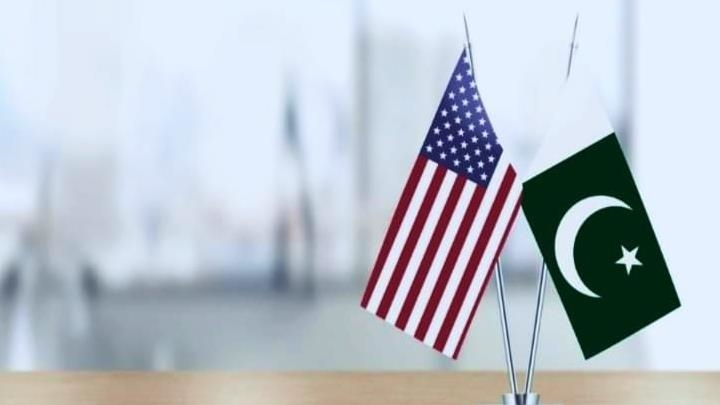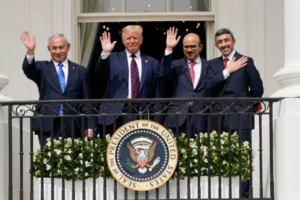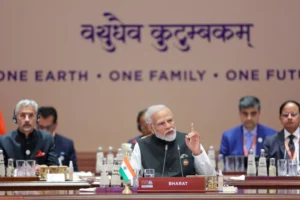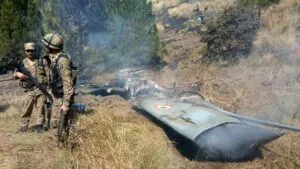Imagine a symphony, not cacophony, where diverse instruments blend beautifully to create a harmonious melody. That’s the promise of the relationship between the United States and Pakistan, two nations whose history is complex but their shared aspirations point towards a hopeful future. Despite the shadows of discord, the United States and Pakistan stand today at a threshold of opportunity. From the Cold War to the War on Terror, their paths have converged on the battlefields of regional security, each offering support and assistance in moments of crisis. As we peep into the future, the winds of change whisper a tale of convergence, interdependence, and a renewed sense of optimism, in the trajectory of bilateral relations.
Pakistan’s economic potential is soaring, fueled by a host of factors: a burgeoning population exceeding 225 million, a strategic location at the crossroads of major trade routes, and a gradually diversifying economy, reshaping from its agrarian outlook to industrial and service-based.
The International Monetary Fund (IMF) projects a 4% real GDP growth for the current fiscal year, solidifying this upward trajectory and attracting significant US attention.
The US-Pakistan Business Council has identified 20 billion US dollars in potential bilateral trade opportunities across various sectors, recognizing Pakistan’s emerging market potential. Additionally, the US Agency for International Development (USAID) has committed over 2 billion US dollars to support Pakistan’s economic development over the past five years, reflecting a growing commitment to collaboration. Furthermore, bilateral trade exceeding 6 billion US dollars reflects a tangible commitment to fostering mutual prosperity and creating a win-win scenario for the two nations.
Beyond the realm of economics, a bedrock of military cooperation underpins the US-Pakistan relationship. This partnership, forged over seven decades, has survived storms and evolved alongside the ever-shifting geopolitical landscape. From the early days of CENTO and SEATO alliances under General Ayub Khan to the unwavering support during the Soviet invasion of Afghanistan under General Zia-ul-Haq, and the strategic collaboration during the War on Terror under General Pervez Musharraf, their partnership has served as a crucial anchor of regional stability. Building on this strong foundation, General Asim Munir’s dedication to modernization and technological advancement is positioning Pakistan as an increasingly attractive partner for the US defense industry.
Military diplomacy plays a crucial role in fostering trust and understanding between the two nations’ armed forces.
Pakistan actively engages in global diplomacy and defense engagements to promote peace, justice, and economic prosperity. Pakistan’s military leadership plays a vital role in forging robust ties with various nations beyond traditional military collaborations. This engagement complements diplomatic efforts and significantly contributes to Pakistan’s foreign policy objectives. Pakistan’s proactive military engagement in socio-economic initiatives, notably through the Special Investment Facilitation Council (SIFC), reflects a dedicated effort to attract foreign investment. Additionally, the country’s economic stabilization strategies, including fiscal and tax reforms, alongside monumental projects like the China-Pakistan Economic Corridor (CPEC), emphasize its commitment to achieving economic stability and fostering growth.
Pakistan’s relations with the USA do not compromise the CPEC or broader relations with China. In the evolving landscape of US-China competition, Pakistan stands uniquely positioned to act as a mediator between these two major powers. These interactions underscore Pakistan’s diverse accomplishments in the past 18 months. Notably, strides in combating terrorism & improving economic conditions have bolstered international community’s confidence in Pakistan. Pakistan’s commitment to a peaceful Afghanistan aligns with its historical, cultural, and economic ties. The understanding of the threat emanating from Afghanistan and the commitment to ensure that Afghan soil is not used against other countries are pivotal points within the Doha Agreement between the USA and the Taliban. Military leadership, through its astute diplomacy specifically in security and economic domains, plays a pivotal role in shaping regional stability and fostering strategic partnerships.
Looking ahead, the convergence of these factors – a booming economy, unwavering military cooperation, and growing economic ties – paints a compelling picture for the future of US-Pakistan relations. Historical mistrust, cultural differences, and competing interests have often led to friction and misunderstandings. Yet, throughout these periods of strained relations, a remarkable capacity for dialogue and reconciliation has existed. Both nations have demonstrated a willingness to learn from past mistakes and work towards a stronger future, recognizing the inherent value of their partnership.
As we move forward, the silver lining in the once-dark clouds becomes increasingly evident.
The interdependence between the United States and Pakistan is not simply a matter of circumstance; it is a strategic imperative driven by economic realities, geopolitical imperatives, and a shared vision for the future. This is an alliance rooted in resilience, forged in shared experiences, and fueled by the promise of a brighter tomorrow. As the world watches with anticipation, the chapters ahead hold the potential for a partnership that transcends the limitations of the past, ushering in an era of unprecedented cooperation and prosperity.
The views expressed in this article are the author’s own and do not necessarily reflect Policy Wire’s policy.




